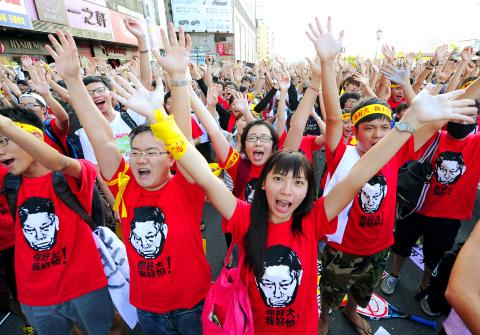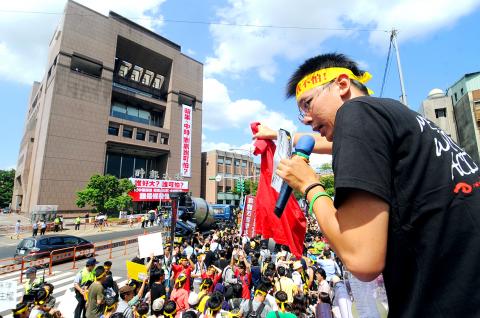Thousands of journalists, students, academics and social activists yesterday took to the streets in Taipei to protest against monopolization of the media and demanded that the National Communications Commission (NCC) help break monopolization of the media.
“No to monopolization of the media, protect professionalism in media,” thousands chanted as they marched from Want Want China Times Group (旺旺中時集團) headquarters to the NCC headquarters in Taipei.
Many of the demonstrators held home-made signs and placards with slogans against media monopolization or the Want Want China Times Group, such as “You’re big, but I’m not scared,” “I would like my news without additives” and “Non-professional media operators should go back to making biscuits.”

Photo: CNA
One woman taking part in the march wore a mask that looked like two hands covering her eyes and held a sign reading: “Media monopoly blinds my eyes.”
“We are gathered here because we are upset that [Want Want China Times Media Group chairman] Tsai Eng-ming (蔡衍明) used media outlets under the group as his own personal tool to attack his enemies. We’re also worried that when the group gets its hands on the largest cable TV service provider, it will be a disaster for the country,” Association of Taiwan Journalists (ATJ) chairwoman Chen Hsiao-yi (陳曉宜) told the crowd.
The ATJ, along with the Campaign for Media Reform, Taiwan Media Watch, the Alliance against Media Monsters and the Youth Alliance against Media the demonstration.

Photo: Lo Pei-der, Taipei Times
“We are here to demand our freedoms of expression and of media,” Chen said. “We call on Tsai to give up his merger plan with China Network Systems (CNS, 中嘉網路).”
Chen was referring to a Want Want plan to acquire some of the cable TV services owned by CNS, the largest cable TV service provider in the country, that was conditionally approved by the NCC last month.
The merger plan has worried many because the Want Want China Times Group already owns several media outlets, including newspapers, a magazine, TV channels and a radio station. Opponents worry that if Want Want buys CNS’ cable TV services, it may be able to interfere with other media outlets, with the power to decide which channels may be broadcast via cable.
The issue did not attract too much public attention until last month, when all media outlets under the group launched a series of reports accusing the Academia Sinica research fellow — who is a strong opponent to the merger case — of paying students to join anti-merger rallies, which was later proved to be false.
When one National Tsinghua University student, Chen Wei-ting (陳為廷), questioned Want Want’s motives, he also became a target of criticism by media outlets under the group.
“CtiTV [of the Want Want China Times Media Group] aired news reports criticizing me 24 hours a day during that time, and each news report could take as long as 15 minutes of air time,” Chen Wei-ting said. “This shows how horrible things could get when a media group has a monopoly.”
Some foreign students also joined the march.
Chong Yee-shan (張玉珊), from Malaysia, said she joined because media monopoly is also a serious problem in her own country, especially in Chinese-language media outlets.
Several human rights groups, such as the Taiwan Association for Human Rights, the Deng Liberty Foundation, Taiwan Students for a Free Tibet, Taiwan Labor Front (TLF) and the Humanistic Education Foundation, participated.
“The media issue is important for social groups, especially those who are working for the rights of the disadvantaged in our society,” TLF secretary-general Son Yu-lian (孫友聯) said. “When all media outlets are in hands of big corporations, disadvantaged people will be silenced.”
Journalism students were among the most predominant groups in the march.
“I want to become a journalist when I finish school, so I am concerned about the work conditions for journalists,” said Kuo Chih-jung (郭芝榕), a student at National Taiwan University’s Graduate Institute of Journalism. “I would like to call on the government to help maintain the independence of media outlets.”
Another journalism student surnamed Lee (李) said she was concerned about how the awareness and energy of the demonstration could be maintained, so that real reform of the media could succeed.
The parade ended in front of the NCC headquarters, as the crowd called on the institution to make or revise laws to help maintain the independence of media outlets, which an NCC official who accepted a petition from ATJ head Chen Hsia-yi promised to help out.
In response, Want Want China Times Group published a full-page advertisement in the China Times yesterday asking: “Who is big? Who is scared?”
“Our news reporting has been always professional and can be scrutinized. We welcome all criticism,” the advert said.
Additional reporting by CNA

AGING: As of last month, people aged 65 or older accounted for 20.06 percent of the total population and the number of couples who got married fell by 18,685 from 2024 Taiwan has surpassed South Korea as the country least willing to have children, with an annual crude birthrate of 4.62 per 1,000 people, Ministry of the Interior data showed yesterday. The nation was previously ranked the second-lowest country in terms of total fertility rate, or the average number of children a woman has in her lifetime. However, South Korea’s fertility rate began to recover from 2023, with total fertility rate rising from 0.72 and estimated to reach 0.82 to 0.85 by last year, and the crude birthrate projected at 6.7 per 1,000 people. Japan’s crude birthrate was projected to fall below six,

US President Donald Trump in an interview with the New York Times published on Thursday said that “it’s up to” Chinese President Xi Jinping (習近平) what China does on Taiwan, but that he would be “very unhappy” with a change in the “status quo.” “He [Xi] considers it to be a part of China, and that’s up to him what he’s going to be doing, but I’ve expressed to him that I would be very unhappy if he did that, and I don’t think he’ll do that. I hope he doesn’t do that,” Trump said. Trump made the comments in the context

SELF-DEFENSE: Tokyo has accelerated its spending goal and its defense minister said the nation needs to discuss whether it should develop nuclear-powered submarines China is ramping up objections to what it sees as Japan’s desire to acquire nuclear weapons, despite Tokyo’s longstanding renunciation of such arms, deepening another fissure in the two neighbors’ increasingly tense ties. In what appears to be a concerted effort, China’s foreign and defense ministries issued statements on Thursday condemning alleged remilitarism efforts by Tokyo. The remarks came as two of the country’s top think tanks jointly issued a 29-page report framing actions by “right-wing forces” in Japan as posing a “serious threat” to world peace. While that report did not define “right-wing forces,” the Chinese Ministry of Foreign Affairs was

PREPAREDNESS: Given the difficulty of importing ammunition during wartime, the Ministry of National Defense said it would prioritize ‘coproduction’ partnerships A newly formed unit of the Marine Corps tasked with land-based security operations has recently replaced its aging, domestically produced rifles with more advanced, US-made M4A1 rifles, a source said yesterday. The unnamed source familiar with the matter said the First Security Battalion of the Marine Corps’ Air Defense and Base Guard Group has replaced its older T65K2 rifles, which have been in service since the late 1980s, with the newly received M4A1s. The source did not say exactly when the upgrade took place or how many M4A1s were issued to the battalion. The confirmation came after Chinese-language media reported